- Home
- Martin Amis
The Information Page 2
The Information Read online
Page 2
Allowed entry, Richard was shown upstairs, not of course by Demeter (who at this hour would be unguessably elsewhere down the great passages), nor by a maid (though there were maids, called things like Ming and Atrocia, shipped here in crates from Sao Paolo, from Vientiane), nor by any representative of the home-improvement community (and they were always about, the knighted architect, the overalled stiff with a mouthful of nails): Richard was shown upstairs by a new type of auxiliary, an American coed or sophomore or grad student, whose straightness of hair, whose strictness of mouth, whose brown-eyed and black-browed intelligence was saying that whatever else Gwyn might be he was now an operation, all fax and Xerox and preselect. In the hall Richard saw beneath the broad mirror a shelf so infested with cardboard or even plywood invitations … He thought of the van outside, a month of tabloids wedged between dash and windscreen. And the two guys within, one white, one black, and the fat German Shepherd, more like a bear than a dog, with its scarf of tongue.
Gwyn Barry was nearing the climax of a combined interview and photo session. Richard entered the room and crossed it in a diagonal with one hand effacingly raised, and sat on a stool, and picked up a magazine. Gwyn was on the window seat, in his archaeologist's suit, also with archaeologist's aura of outdoor living, rugged inquiry, suntan. He
filled his small lineaments neatly, just as his hair filled the lineaments
(only a rumor, for now) of male-pattern recession. Gwyn's hair was actually gray, but bright gray: not the English gray of eelskin and wet slates; nor yet the gray that comes about through tiredness of pigment,and dryness. Bright gray hair-the hair (Richard thought) of an obvious charlatan. Richard himself, by the way, was going bald too, but anarchi-cally. No steady shrinkage, with the flesh stealing crownwards like rising water; with him, hair loss happened in spasms, in hanks and handfuls. Visits to the barber were now as fearful and apparently hopeless as visits to the bank manager, or the agent-or the garage, in the tomato-red Maestro.
"Have you any thoughts," the interviewer was saying, "on turning forty?"
"Happy birthday," said Richard.
"Thanks. It's just a number," said Gwyn. "Like any other."
The room-Gwyn's study, his library, his lab-was very bad. When in this room it was Richard's policy to stare like a hypnotist into Gwyn's greedy green eyes, for fear of what he might otherwise confront. He didn't really mind the furniture, the remoteness of the ceiling, the good proportion of the three front windows. He really didn't mind the central space-platform of floppy discs and X-ray lasers. What he minded were Gwyn's books: Gwyn's books, which multiplied or ramified so crazily now. Look on the desk, look on the table, and what do you find? The lambent horror of Gwyn in Spanish (sashed with quotes and reprint updates) or an American book-club or supermarket paperback, or something in Hebrew or Mandarin or cuneiform or pictogram that seemed blameless enough but had no reason to be there if it wasn't one of Gwyn's. And then Gallimard and Mondadori and Livro Aberto and Zsolnay and Uitgeverij Contact and Kawade Shobo and Magveto Konyvkiado. In the past Richard had enjoyed several opportunities to snoop around Gwyn's study-his desk, his papers. Are snoopers snooping on their own pain? Probably. I expect you get many young girls who. You will be delighted to hear that the air tickets will be. The judges reached their decision in less than. These terms are, we feel, exceptionally. I am beginning to be translating your. Here is a photograph of the inside of my. Richard stopped flipping through the magazine on his lap (he had come to an interview with Gwyn Barry), and stood, and surveyed the bookshelves. They were fiercely alphabetized. Richard's bookshelves weren't alphabetized. He never had time to alphabetize them. He was always too busy-looking for books he couldn't find. He had books heaped under tables, under beds. Books heaped on windowsills so they dosed out the sky.
Interviewer and interviewee were winding up some guff about the deceptive simplicity of the interviewee's prose style. Unlike the interviewer, the photographer was a woman, a girl, black-clad, Nordic,leggy-how she crouched and teetered for her images of Gwyn! Richard looked on with a frowsy sigh. Being photographed, as an activity, was in itself clearly not worth envying. What was enviable, and unbelievable, was that Gwyn should be worth photographing. What happened inside the much-photographed face-what happened to the head within? The Yanomano or the Ukuki were surely onto something. One shot wouldn't do it, but the constant snatch of the camera's mouth-it would take your reality, in the end. Yes, probably, the more you were photographed, the thinner it went for your inner life. Being photographed was dead time for the soul. Can the head think, while it does the same half smile under the same light frown? If this was all true, then Richard's soul was in great shape. No one photographed him anymore, not even Gina. When the photographs came back from the chemist's, after an increasingly infrequent Tull holiday, Richard was never there: Marius, Marco, Gina, some peasant or lifeguard or donkey-and Richard's elbow or earlobe on the edge of the frame, on the edge of life and love .. . Now the interviewer said, "A lot of people think that, because you're the figure you now are, that the next step is politics. What do you . .. Do you … ?"
"Politics," said Gwyn. "Gosh. Well I can't say I've given it that much thought. Thus far. Let's say I wouldn't want to rule it out. As yet." "You sound like a politician already, Gwyn."
This was Richard. The remark went down well-because, as is often pointed out, we are all of us in need of a good laugh. Or any kind of laugh at all. The need is evidently desperate. Richard dropped his head and turned away. No, that really wasn't the kind of thing he wanted to be saying. Ever. But Gwyn's world was partly public. And Richard's world was dangerously and increasingly private. And some of us are slaves in our own lives.
"I think writing'll do me," said Gwyn. "They're not incompatible, though, are they? Novelist and politician are both concerned with human potential."
"This would be Labour, of course." "Obviously." "Of course." "Of course."
Of course, thought Richard. Yeah: of course Gwyn was Labour. It was obvious. Obvious not from the ripply cornices twenty feet above their heads, not from the brass lamps or the military plumpness of the leather-topped desk. Obvious because Gwyn was what he was, a writer, in England, at the end of the twentieth century. There was nothing else for such a person to be. Richard was Labour, equally obviously. It oftenseemed to him, moving in the circles he moved in and reading what he read, that everyone in England was Labour, except the government. Gwyn was the son of a Welsh schoolteacher (his subject? Gym. He taught gym). Now he was middle class and Labour. Richard was the son of a son of a Home Counties landowner. Now he was middle class and Labour. All writers, all book people, were Labour, which was one of the reasons why they got on so well, why they didn't keep suing each other and beating each other up. Not like America, where spavined Alabaman must mingle with Virginian nabob, where tormented Lithuanian must extend his hand to the seven-foot Cape Codder with those true-blue eyes. By the way, Richard didn't mind Gwyn being rich and Labour. Richard didn't mind Gwyn being rich. It was important to establish the nature of the antipathy (to free it from distractions), before everything gets really awful, all ripped and torn. He made me hit my kid, thought Richard. He made me-with my wife .,. Rich and Labour: that was okay. Having always been poor was a good preparation for being rich. Better than having always been rich. Let the socialist drink champagne. At least he was new to it. Anyway, who cared? Richard had even been a member of the Communist Party, in his early twenties-for all the fucking good that did him.
"Thank you very much," said the interviewer, in a tone of mild surprise. For a moment he hesitated and stared desolately at his tape recorder, but then nodded and got to his feet. Now the photographer's presence started to gather and expand-her height, her health.
"If I could just have three minutes over in the corner there."
"I don't pose," said Gwyn. "The deal was you snap away while we talked. But no posing."
"Three minutes. Please. Two minutes. The light's so perfect there."
> Gwyn acquiesced. He acquiesced, Richard thought, in the manner of someone who had similarly acquiesced many times before, conscious both of his magnanimity and of its limits. The well and all its sweet water would surely one day run dry.
"Who's coming to this thing?" Gwyn called, from beyond, as the photographer's trussed and pouch-swathed figure interposed itself between the two men.
"Not sure." Richard named some names. "Thanks for coming along. On your birthday and everything."
But now without turning to him the photographer with frantic fingers was making quelling gestures behind her back and saying,
"Good: I'm getting something. I'm getting something. Higher. Stay. That's very good. That's very good. That's beautiful.?
On the way out they encountered Lady Demeter Barry in the hall. She was twenty-nine, and had the abstracted and disorganized air you might expect from somebody who was related to the Queen. Like Gina Tull, she had no connection with literature other than marriage to one of its supposed practitioners.
"Got a lesson, love?" said Gwyn, moving up close.
Richard waited. "My dear Demi," he then said, giving a brief stiff bow before kissing her on either cheek.
The orange van was still out there-the soiled orange van, with its soiled white trim, and its soiled cream curtains fringing the windows side and back. Steve Cousins sat there, alone but for Giro, having sent 13 off for more Tings.
A monkey. A pony. Cockle and hen: ten. Why the animal imagery for proletarian money? Lady Godiva: fiver. Then the back slang. Rouf, nevis: sounds stupid. A carpet stood for three (and its multiples). And six was half a stretch, and a stretch was twelve, and a double carpet was thirty-three, and sixty-six was a … Jesus. That was type talk, and prison talk, and you shouldn't use it. And Steve had never gone to prison. He had never gone to prison, being (as many lawyers on many occasions had wearily reminded many courtrooms) of stainless record … At this juncture Steve was reading a magazine called Police Review but he also had a book on the dash: Crowds and Power, by Elias Canetti. Funnily enough, in Steve's circle (and Steve's circle was elliptical and eccentric), reading books like Crowds and Power was tantamount to a proclamation that you had gone to prison-and for a very long time. Beware the convict with his Camus and his Kierkegaard, his Critique of Pure Reason, his Four Quartets…
Steve. Steve Cousins. Scozz.
Scozz? Scozz had dyed hair, worn spiky-the color of syrup or even treacle; but the roots were black (sedimentary dye from a slightly earlier phase). His hair resembled damp ripe hay that had undergone reckless chemical enrichment. Where the colors merged they looked like the creases between a smoker's teeth. Scozzy didn't smoke. You don't smoke: what you do is stay fit and healthy. His face was long, despite the absence of chin (his chin was about the same size as the Adam's apple on which it perched); and in certain lights his features seemed to consist of shifting planes and lenses, like a suspect's face "pixelated" for the TV screen: smeared, and done in squares; blurred, and done in boxes. Scozzy wore two wire-thin silver rings in either ear. His pre-violence stare featured the usual bulged eyes-but the lips also widened and parted in avidity and amusement and recognition. Not tall, not stocky: he surprised peo-pie when he took off his shirt, revealing himself like an anatomical demonstration. He excelled at surprise. In fights and frightenings, the surprise was always inordinate. Because Steve didn't stop. When I start, I don't stop. I don't stop. He was the kind of criminal who knew what recidivist meant. He was good. He had the ism.
Unsmilingly Scozzy rotated his neck muscles as 13 slid the door open and climbed back inside. Giro, lying further back now in his huge fur coat, sighed hotly in sleep.
13 said, "He come out?"
"Both did. Hopped in a cab. Account."
"Size of that racking gaff."
Scozzy turned to him, and exhaled, and said indulgently, "Oh, Thirt. Thirt, mate. What do you think we're here for? Think we come to screw it? Run round the house nicking stuff and fucking everything up?"
13 smiled with lowered head. He had had something of the sort in mind.
"Get a life. Get a century."
"Hey."
"Hold up."
They watched.
"The wife," said Scozzy, with conviction. "Off to her lesson."
"Big girl," said 13. "Yat," he added, with admiration.
Yeah: Lady Demeter certainly looked like a brother's dream pull: blonde, rich, stacked. But she wasn't Steve's type. No human woman was. No, nor man, neither.
13 reached for the ignition and looked up expectantly but Steve's slow blink was enough to tell him they were going nowhere for now. With Scozzy, you were always doing much less than you thought you'd be doing. Much less, then much more.
"Crash said she was a big girl."
Steve spoke neutrally. Come to think of it: "The Queen's got big tits. Oi. These ain't Tings. They Lilts!"
"Pineapple-grapefruit crush," said 13 petulantly. "Jesus. Same difference."
An hour into lunch in this fish restaurant for rich old men and something extraordinary was about to happen. Nothing from the outside world. It was just that Richard was on the verge of passionate speech.
Yes: passionate speech.
You don't think that's extraordinary? Oh, but it is. Try and think of the last time you did it. And I don't just mean "Well I think it'sabsolutely disgraceful" or "You're the one who brought it up in the first place" or "Get straight back into your room and get into bed." I'm talking speech: passionate speech. Speeches hardly ever happen. We hardly ever give them or hear them. See how bad we are at it. "Marius! Marco! The pair of you-are a pair!" See how we fuck it up. We salivate and iterate. Women can do it, or they get further, but when the chance of tears presents itself they usually take it. Not having this option, men just shut up. They are all esprit d'escalier. Men are spirits on the staircase, wishing they'd said, wishing they'd said … Before he spoke, there in the buttoned plush, Richard hurriedly wondered whether this had been a natural resource of men and women-passionate speech-before 1700 or whenever Eliot said it was, before thought and feeling got dissociated.The sensibility of men was evidently much more dissociated than the sensibility of women. Maybe, for women, it just never happened. Compared to men, women were Metaphysicals, Bonnes and Marvells of brain and heart.
So, his passionate speech. Passionate speech, which unrolls, with thoughts and feelings dramatized in words. Passionate speech, which is almost always a bad move.
How can we explain this' After all, Richard was here to impress people. He wanted a job.
Was it the place? A semicircular banquette, full of food and drink and smoke-and, beyond, little bunkers full of old men patiently jawing their way through the money extorted by their forebears?
Was it the company? Financier, male columnist, female columnist, publisher, newspaper diarist, newspaper profilist, photographer, captain of industry, Shadow Minister for the Arts, Gwyn Barry?
Was it the alcohol provided and consumed? Actually Richard had been very good, managing to get through a Virgin Mary and a lite beer before his pre-lunch whisky. Then a ton of wine. But before that, while everyone was still milling around, he had gone to the pub across the road with Rory Plantagenet-the newspaper diarist. Richard and Rory sometimes described one another as schoolfriends, which is to say that they had been at the same school at the same time. The school was Ridding-ton House-well known to be the least good public school in the British Isles. For some years now Richard had been selling Rory literary gossip. How much that advance had been. Who would win that prize. Occasionally, and more and more often, he sold him gossip about literary divorces, infidelities, bankruptcies, detoxifications, diseases. Rory paid
for the information, and always for all the drinks, as a kind of tip. He paid for the gen and the gin, the shrugs, the cheap jokes. Richard didn't like doing this. But he needed the money. While he did it, he felt as if hewas wearing a cheap new shirt-one from which he had failed to remove the packager's pins.
; Was it the provocation? The provocation, some might think, turned out to be considerable. It was sufficient, in any case.
London weather was also bound to play its part: a hot noon gloom. Like night falling on the interior of the church, the lunchers hovered and gathered …
Gwyn Barry had his photograph taken. The financier-Sebby-had his photograph taken. Gwyn Barry was photographed with the financier. The publisher was photographed with Gwyn Barry and the captain of industry. The captain of industry was photographed with the Shadow Minister of the Arts and Gwyn Barry. Two speeches were given, read from pieces of paper-neither of them passionate. The captain of industry, whose wife was interested in literature more than enough for both of them (Gwyn often dined there, Richard knew), gave a speech in praise of Gwyn Barry on this, his fortieth birthday. That took about ninety seconds. Then the financier gave a speech during which Richard smoked three cigarettes and stared tearfully at his empty glass. So the financier was trying to get something back for his money. It wasn't just going to be a free meal with a bit of slurred shop over coffee. The financier spoke about the kind of literary magazine he would like to be associated with- the kind of magazine he was prepared to be the financier of. Not so much like magazine A. Not so much like magazine B. More like magazine C (defunct) or magazine D (published in New York). Gwyn Barry was then asked about the kind of magazine he would like to be associated with (the kind that had high standards). Ditto the captain of industry, the Shadow Minister for the Arts, the female columnist, the male columnist. Rory Plantagenet was not consulted. Neither was the photographer, who was leaving anyway. Neither, depressingly, was Richard Tull, who was struggling to remain under the impression that he was being groomed for the editorship. The only questions that came his way were about technical matters-print runs, break-even junctures, and the like.

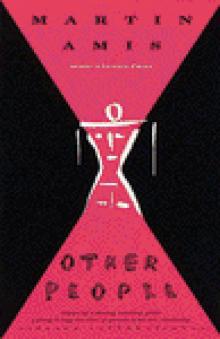 Other People
Other People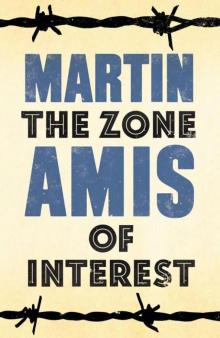 The Zone of Interest
The Zone of Interest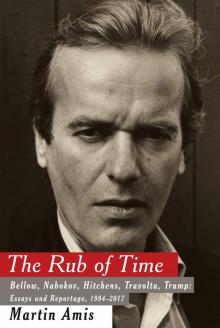 The Rub of Time: Bellow, Nabokov, Hitchens, Travolta, Trump
The Rub of Time: Bellow, Nabokov, Hitchens, Travolta, Trump Koba the Dread
Koba the Dread Success
Success London Fields
London Fields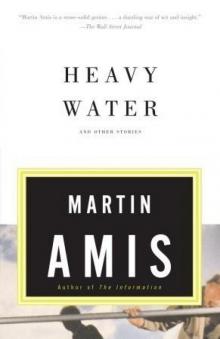 Heavy Water: And Other Stories
Heavy Water: And Other Stories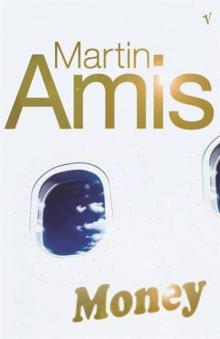 Money
Money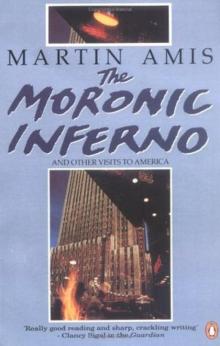 The Moronic Inferno and Other Visits to America
The Moronic Inferno and Other Visits to America Yellow Dog
Yellow Dog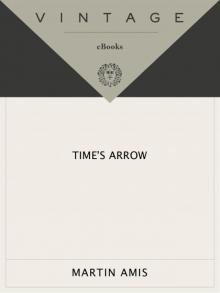 Time's Arrow
Time's Arrow Experience: A Memoir
Experience: A Memoir Einstein's Monsters
Einstein's Monsters The Pregnant Widow
The Pregnant Widow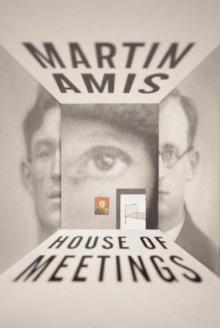 House of Meetings
House of Meetings The Information
The Information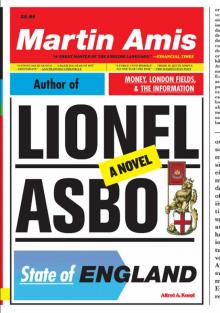 Lionel Asbo: State of England
Lionel Asbo: State of England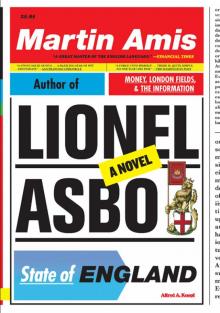 Lionel Asbo
Lionel Asbo Heavy Water and Other Stories
Heavy Water and Other Stories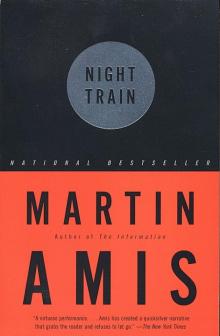 Night Train
Night Train Heavy Water
Heavy Water The War Against Cliche: Essays and Reviews 1971-2000 (Vintage International)
The War Against Cliche: Essays and Reviews 1971-2000 (Vintage International)